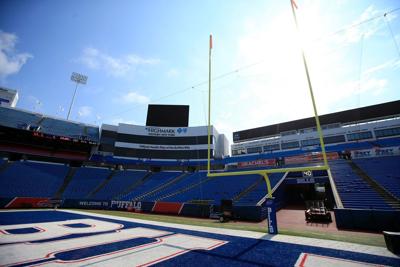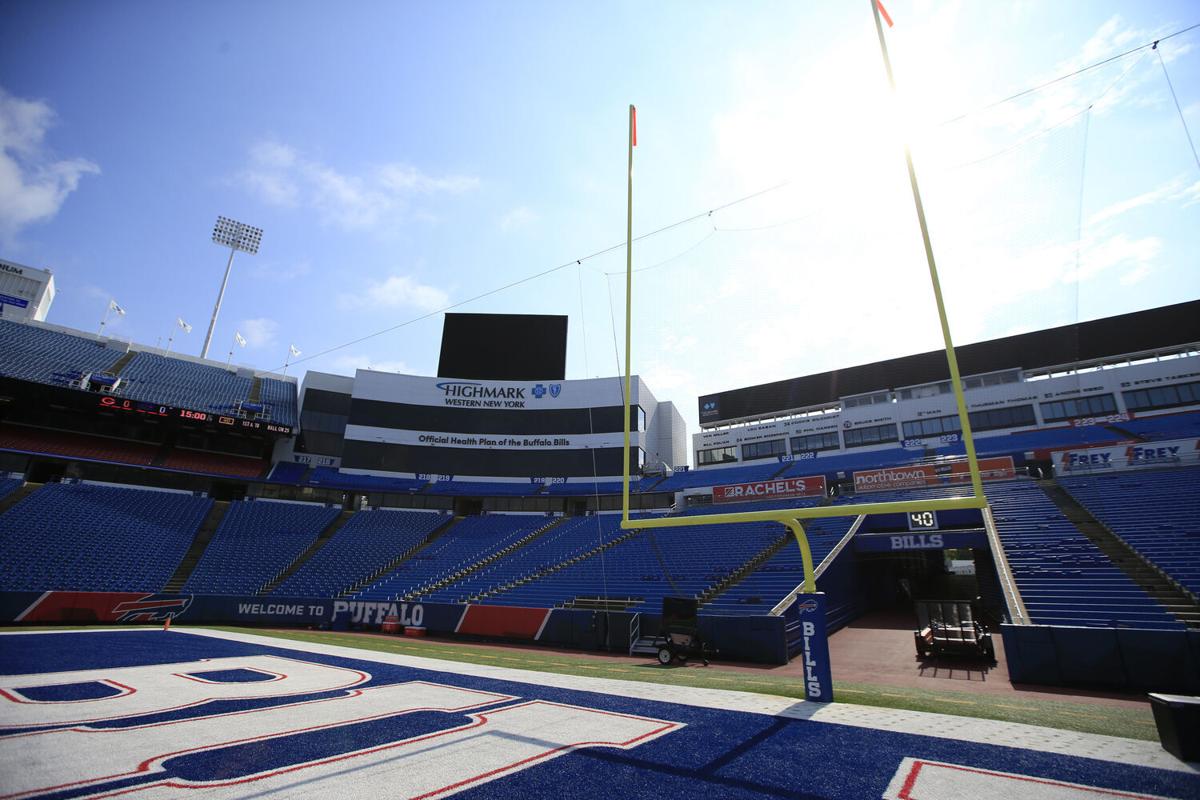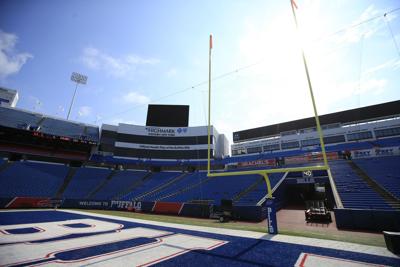When the National Football League owners show up next month in New York City for team meetings, the list of discussion items will be expansive.
But one item sure to be on the minds if not the itinerary of all the owners will be the Buffalo BillsŌĆÖ quest for a new $1.4 billion stadium in Orchard Park. And what happens during official meetings or informal chats could have a dramatic impact on both the future of a stadium and the team.
ŌĆ£I assure you there will be discussions, even if itŌĆÖs not on any agenda,ŌĆØ said Marc Ganis, a Chicago-based sports consultant who has worked with approximately two-thirds of the NFLŌĆÖs teams and about two dozen sports facility projects. ŌĆ£There will be discussions among owners. There will be questions to Terry and to Kim: ŌĆśWhatŌĆÖs going on? Are you guys getting closer? Are you feeling optimistic?ŌĆÖ Perceptions start getting created, and those things can snowball.ŌĆØ
People are also reading…
The owners and representatives of those 31 other teams will want to hear that negotiations involving the Bills, New York State and Erie County are going well. That could include, at best, the blueprint of a deal or an offer that all sides consider workable. Another positive option ŌĆō and perhaps the most realistic one ŌĆō is for team owners Kim and Terry Pegula to be able to say the sides are talking regularly, working together productively, and operating on mutually agreeable deadlines.
Ron Raccuia, executive vice president at Pegula Sports and Entertainment, the company that manages the PegulasŌĆÖ holdings, which also include the National Hockey LeagueŌĆÖs Buffalo Sabres, was precise if not illuminating in his response when asked whether the owners' meetings are considered a key date in the Pegula negotiation timeline.
ŌĆ£The NFL calendar as a whole is very important to our stadium discussions, and have always been that way,ŌĆØ he said, suggesting that includes the full league meetings, which happen again March 27-30 in Florida, as well as committee meetings and other key events where owners gather.
Raccuia declined to expand on his comment or discuss the status of negotiations. But Ganis said it is imperative that team owners feel reassured.
In a telephone interview late last week, Ganis suggested that all parties involved in lease negotiations need to take into account a "number of calendars." That includes the election cycle, Ganis said, and also the NFL meeting schedule, plus the lifespan of the current stadium juxtaposed against the multiple years needed to design and build a new one.
The convergence of those calendars could have implications for the stadium negotiations:
ŌĆó Election season and stadium negotiations donŌĆÖt mix well. Gov. Kathy Hochul is finishing the term of recently resigned former Gov. Andrew Cuomo, which ends in less than 15 months, and running for a full four-year term in 2022. That is also an election year for the state Assembly and Senate. That means 2022 is going to be a politically complicated year to be considering a major stadium project with significant public funding, which is what the Pegulas are seeking. A of the 21 most recent new NFL stadiums found an average of a 50-50 split between public and private funding. But market size played a major role in how those deals were weighted. In the 12 largest markets, public funding accounted for only a third of the costs on average. But in the nine regions with the smallest populations, the public share rose to an average of 73%.
Buffalo is the second-smallest market not only in the NFL, but in all four major league sports. (Only Green Bay is smaller in football, and Winnipeg in the National Hockey League.) The Pegula team has not publicly stated a percentage of costs it ŌĆō and likely by extension, the NFL and its owners ŌĆō expect public funds to cover. But those figures suggest it will be a significant portion of the $1.4 billion stadium they are seeking.
Hochul, a Democrat, is already certain to have a number of primary challengers, including from the left of her party. She has spoken in general, supportive terms about the lease negotiations, that ŌĆ£it'll be a collaborative approach to getting to the result which is smart for the taxpayers, but also ensures the longevity of the Buffalo Bills. That is a high priority of mine: the Buffalo Bills in Buffalo.ŌĆØ
Hochul has offered no insights publicly on her willingness to allocate hundreds of millions, or even $1 billion or more, to a Bills stadium project. But if she does, it will evoke significant opposition, especially from the left, with accusations of corporate welfare. But not doing it would equate to inviting the Bills and NFL to look at relocation options, which is a politically difficult position for the Buffalo-born governor.
This puts Hochul in a tricky position, and does the same for legislators running for re-election┬ĀŌĆō and thatŌĆÖs what complicates 2022.
ŌĆ£The reality is that if we get beyond the spring, we're in the middle of a gubernatorial election, as well as the election for all of the legislators,ŌĆØ Ganis said. ŌĆ£Historically, that is a very bad time for any state legislature to take up a major project like this.ŌĆØ
Meanwhile, a spokesman for Erie County Executive Mark Poloncarz ŌĆō whose term runs through 2023 ŌĆō told The News last week that representatives from the county, state and Bills meet both in person and virtually ŌĆ£to hold discussions on a regular basis as part of the negotiation process.ŌĆØ The spokesman added, ŌĆ£Erie County is aware of the timeline associated with the NFL owners meetings next month and the shared interest of all parties involved to make progress as negotiations continue.ŌĆØ
Poloncarz has deep experience with lease negotiations and the factors that impact timing. He was a key player one decade ago in negotiations for the . In his book about that deal ŌĆō ŌĆ£Beyond the Xs and Os: Keeping the Bills in BuffaloŌĆØ ŌĆō Poloncarz writes about negotiation timing that was tied to NFL meeting schedules.
Another vital figure in those earlier lease negotiations ŌĆō attorney Irwin Raij, whom the Cuomo administration hired to represent New York in the talks ŌĆō is once again working for the state.
ŌĆó The opening of a new stadium is years out, but time is comparatively tight. The teamŌĆÖs current lease expires in 2023, and a recent report commissioned by Erie County suggests that Highmark Stadium will need significant renovations in the next five to seven years. The Pegula Sports/Bills camp has expressed interest in selecting a stadium architect ŌĆō followed by a construction manager ŌĆō as soon as possible.
"Our football team has to play someplace at the conclusion of our lease," Raccuia . "And we've been pretty straightforward with everybody to say: Until we can get a semblance of a deal and an understanding that we're going to work towards a new stadium, we just can't extend the current lease. It does no one any good."
In a , sports executive and developer Larry Quinn addressed the timing of the stadium. ŌĆ£The Pegulas are trying to create urgency so people focus on it,ŌĆØ said Quinn, who oversaw the construction of KeyBank Center in the late 1990s, then became president, and later, managing partner of the Sabres.
ŌĆ£They should be doing that,ŌĆØ added Quinn, who is not involved in the lease talks but has engaged in informal discussions with multiple key parties. Aside from the construction timeline itself, Quinn also noted that interest rates are low and federal infrastructure dollars are flowing heavily, which means ŌĆ£you donŌĆÖt have the pressure of building a stadium, but not building roads or hospitals.ŌĆØ
ŌĆó The NFL is often, and accurately, referred to as an exclusive club. Every team is owned by an individual┬ĀŌĆō except Green Bay, whose community ownership structure was grandfathered in the 1980s. The upcoming owners meetings are the first ones held in-person since the pandemic, and thereŌĆÖs plenty of catching up to do over dinners, drinks and during breaks. ŌĆ£They talk about family,ŌĆØ Ganis said. ŌĆ£They talk about the league. They talk about their teams. They talk about politics.ŌĆØ
That means the Bills lease situation will become an important topic of discussion. ŌĆ£It is the hottest topic for the Bills, other than how great theyŌĆÖre going to be on the field this year,ŌĆØ Ganis said.
The NFL, which had $16 billion in revenues in 2019, ŌĆō and dropped to $12 billion during the pandemic-stifled 2020 season ŌĆō is highly profitable for its owners. That comfort makes them unlikely to want to move the Bills┬ĀŌĆō unless, Ganis said, prompted to think in that direction.
ŌĆ£The NFL tries to do the right thing for the right reasons as often as they possibly can, and it is the right thing for the Bills to stay in Buffalo for generations to come,ŌĆØ Ganis said. ŌĆ£The league is successful the way it is right now, and itŌĆÖs the right thing to do. But IŌĆÖm going to give you the caveat: Ask me in six months if there isnŌĆÖt a meaningful participation by the public sector.ŌĆØ























